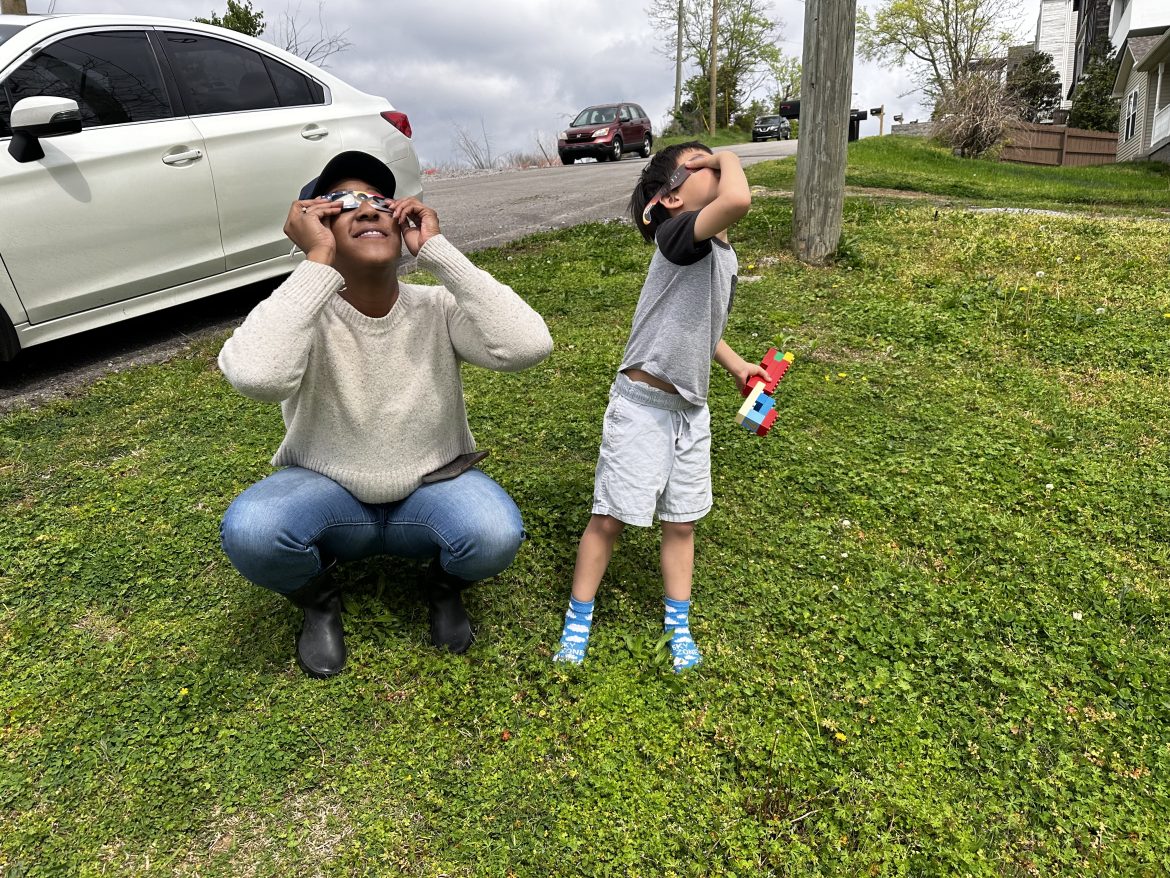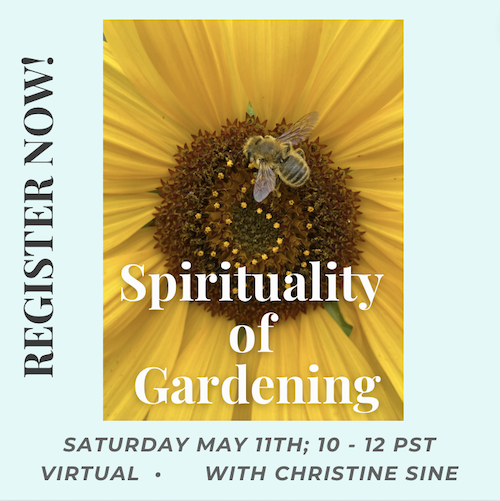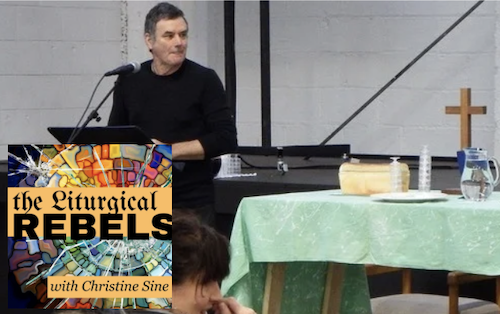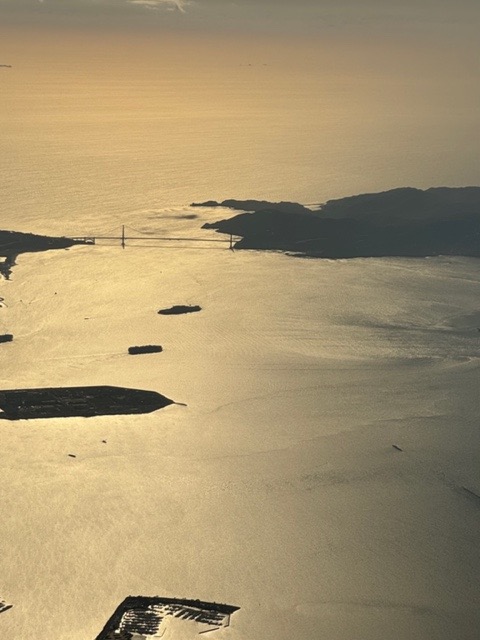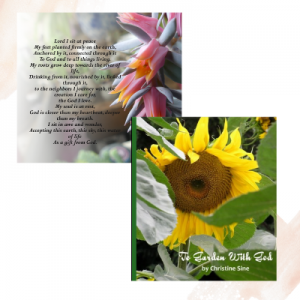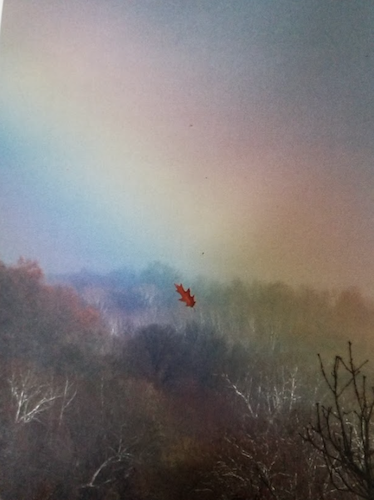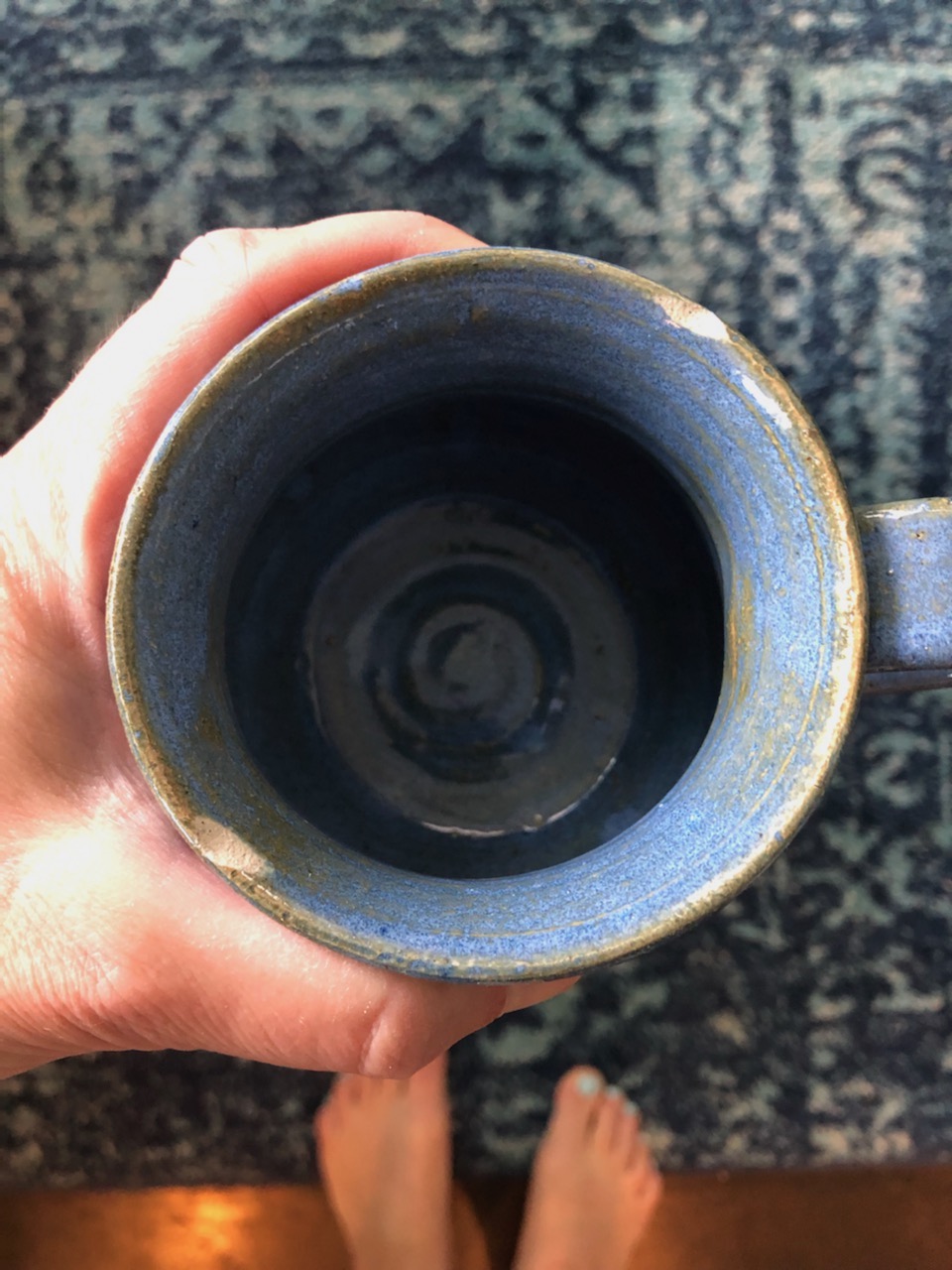This week, many of us in America were caught up in the wonder of the Solar Eclipse. My mom sent everyone in our family an Easter card that included the special glasses that are needed to watch the wonder. We had a rather blustery day here in Nashville, where the clouds hid the sun more than the sun was out. But I got out my glasses at the appropriate time and I watched from my window where I had watched part of the eclipse in 2017. I really couldn’t figure out if the glasses worked because I couldn’t get a glimpse of that bright light. Finally, the clouds parted, and I was able to see the beginning of the eclipse! I honestly was feeling more sad than elated because I knew that friends had traveled long distances to view it in the path of totality. One church community her in town did a weekend together to celebrate the wonder and watch for the light! Just as I was feeling a bit neglected, I got a text from a neighbor wondering if I had any extra eclipse glasses! I had two pairs total, so I ran down the street and we shared the glasses and the joy of watching the eclipse in community! Her daughter came out, and then the new neighbors next door to her including two cute little boys. We passed around the glasses and as the clouds moved out of the way and back in the way, of the sun, we all got excited about catching glimpses of this heavenly wonder. My neighbor who’d texted me, Miss Angela praised God for this amazing sight and prayed for our world. She said how much we needed this right now because it was bringing us all together, uniting us around something good and wonderful! Miss Angela gave me NEW EYES to see the wonder of the eclipse! It was a gift I needed! And a gift our country needed to bring us together!
The disciples are still in need of NEW EYES to recognize and see the Resurrection! They are still trying to come to grips with the news that Jesus is alive! READ LUKE 24: 13-35 NLT
13 That same day two of Jesus’ followers were walking to the village of Emmaus, seven miles[a] from Jerusalem. 14 As they walked along they were talking about everything that had happened. 15 As they talked and discussed these things, Jesus himself suddenly came and began walking with them. 16 But God kept them from recognizing him.
17 He asked them, “What are you discussing so intently as you walk along?”
They stopped short, sadness written across their faces. 18 Then one of them, Cleopas, replied, “You must be the only person in Jerusalem who hasn’t heard about all the things that have happened there the last few days.”
19 “What things?” Jesus asked.
“The things that happened to Jesus, the man from Nazareth,” they said. “He was a prophet who did powerful miracles, and he was a mighty teacher in the eyes of God and all the people. 20 But our leading priests and other religious leaders handed him over to be condemned to death, and they crucified him. 21 We had hoped he was the Messiah who had come to rescue Israel. This all happened three days ago.
22 “Then some women from our group of his followers were at his tomb early this morning, and they came back with an amazing report. 23 They said his body was missing, and they had seen angels who told them Jesus is alive! 24 Some of our men ran out to see, and sure enough, his body was gone, just as the women had said.”
25 Then Jesus said to them, “You foolish people! You find it so hard to believe all that the prophets wrote in the Scriptures. 26 Wasn’t it clearly predicted that the Messiah would have to suffer all these things before entering his glory?” 27 Then Jesus took them through the writings of Moses and all the prophets, explaining from all the Scriptures the things concerning himself.
28 By this time they were nearing Emmaus and the end of their journey. Jesus acted as if he were going on, 29 but they begged him, “Stay the night with us, since it is getting late.” So he went home with them. 30 As they sat down to eat,[b] he took the bread and blessed it. Then he broke it and gave it to them.
31 Suddenly, their eyes were opened, and they recognized him. And at that moment he disappeared!32 They said to each other, “Didn’t our hearts burn within us as he talked with us on the road and explained the Scriptures to us?” 33 And within the hour they were on their way back to Jerusalem. There they found the eleven disciples and the others who had gathered with them, 34 who said, “The Lord has really risen! He appeared to Peter.[c]”
35 Then the two from Emmaus told their story of how Jesus had appeared to them as they were walking along the road, and how they had recognized him as he was breaking the bread.
What speaks to you today?
What do you notice from the passage that you didn’t notice before?
What questions come up for you as you listened to the passage?
How did you view the Eclipse this week or see some photos of it? Did it inspire, did you notice or care? What did you notice?
“How much joy do you get from your relationship with God? How much time do you spend relishing the wonder of who God is? These are some of the questions I ask in The Gift of Wonder that I plan to continue revisiting over the next few weeks as I reread the book. Maybe you would like to revisit The Gift of Wonder and some of its suggestions too. This week in the aftermath of the incredible solar eclipse on Monday is a great time to do that” Christine Sine
Do you feel Joy in your relationship with God/Jesus right now? Or is your relationship in need of a resurrection, a re-do, a re-up?
The disciples and followers of Jesus all got a NEW VIEW of Jesus post resurrection and they developed a NEW relationship with Him too.
Consider and Think about how these folks changed their views of Jesus…what do you notice?
Mary, mother of Jesus
Mary Magdalene
Peter
John
Thomas
The two on the way to Emmaus
These two followers of Jesus were in deep grief and despair. They were confused by all that had happened. What things are bringing you grief and/or confusion these days? Talk to Jesus about this.
Why is it so hard for us to recognize Jesus in our everyday world? What things cause you to miss Jesus?
Jesus disappears, he just leaves. Have you ever felt like you’ve seen Jesus but then lost sight of him?
These disciples don’t get discouraged by Jesus just vanishing. Instead, they rush back to tell their friends what they have seen. Who would you like to hurry back to tell about seeing Jesus? Write down their names and remember to pray for them today. Text them or send them a card just to say you are thinking of them and sending them love.
The disciples almost missed Jesus in this story. Jesus was continuing his journey, but they invited him to stay with them and come in for food. By practicing hospitality and they got to recognize Jesus. What are some ways you have experienced Jesus in the hospitality of others? How can practice hospitality in the weeks ahead in order to help people experience more of the love of Jesus and his presence?
What is helping you SEE and to recognize Jesus these days?
What do you need to practice in the days ahead to help you find new joy and/or renewed vision in your relationship with Jesus?
What can you do to recapture the wonder of nature, of God/Jesus?
READ THE POEM
Seeing God by Suellen Shay
We cannot see you
and yet in so many ways we have seen you,
We cannot touch you
but we have experienced and felt you.
You have been in the full moon and the early morning mist,
the bright blue sky
and the cool night air
after a scorching day.
You are the rock
that anchors us in uncertain times,
You are the hope
that keeps us going on a road with few signposts,
You are the presence
when we feel disoriented and estranged.
You are the compassion
that knits us even to strangers,
You are the justice
that tugs at our complacency,
You are the joy
that unexpectedly overwhelms us,
You are the love
that banishes all fear.
We praise you for revealing yourself to us in all these ways –
and for Christ, your full revelation. -SUELLEN SHAY-
ACTION: When you put on your glasses, or wear your sun glasses this week, Ask Jesus to help you recognize him in fresh ways! And pray for new eyes to see! And if you have an extra pair of sun glasses or eclipse glasses, keep them out as reminders!***
Jesus give us new eyes to see and new ears to hear your voice and experience the wonder of RESURRECTION this Eastertide! AMEN
***You can find a prayer station based on the Table at Emmaus that includes praying with Sun Glasses in AT THE TABLE WITH JESUS Sacred Space Kit
Join us on May 11 from 9:30 am to 12:30 pm PDT (check my timezone) We will discuss connections between community, spirituality and gardening. Explore the wonderful ways that God and God’s story are revealed through the rhythms of planting, growing and harvesting as well as the beauty of nature. This webinar is for anyone who admires the beauty of God’s good creation, likes to walk in nature, sit by the ocean or just relax and listen to the birds in the trees. It is based on Christine Sine’s popular book, To Garden with God and each participant will receive a digital copy of this book. Register here.
This virtual retreat will help reconnect us to the wonder of a God who is all around us in the natural world. We will discuss not only how the life, death and resurrection is lived out in the garden, but also how to enter into the wonder of God through creative practices like contemplative nature walks, Lectio Tierra, creating a leaf rubbing, walking barefoot, and others. This will be a fun, instructive and interactive session. I hope you will join us.
NOTE: There has been a time change for this – from 2 hrs to 3 hours for no extra charge. This is because I do not feel I can give this topic justice in just 2 hours.
d 
Episode 5 with Mark Pierson
In this episode Mark Pierson joins Christine Sine and co-host Lilly Lewin to discuss the concept of worship curation and its impact on the way they approach church. Mark Pierson is a worship curator and pastor of Rhythms of Grace church in Auckland New Zealand. Mark founded MainStage Music and Arts festival which became Festival One in New Zealand also curates worship for large events around the world. I think he coined the term ‘worship curator,’ and describes it as curating contexts and spaces built around practices that offer people the potential for transformational engagement with God. He shares examples of curated worship experiences, including art installations and the Tea and Be ceremony which is his latest passion. The conversation also touches on the challenges faced in introducing creative elements to traditional church settings and the importance of curating people’s gifts.
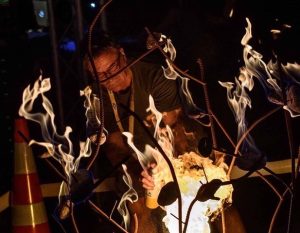
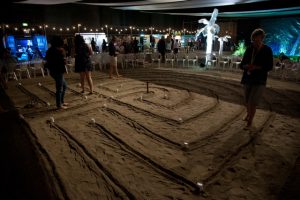 Takeaways
Takeaways
- Worship curation involves curating contexts and spaces that offer opportunities for transformational engagement with God.
- Curated worship experiences can take various forms, including art installations and rituals like Tea and Be.
- Introducing creativity to traditional church settings can be challenging, but it is important to create spaces where people can engage with God in new ways.
- Curating people’s gifts and providing opportunities for them to contribute to worship can enhance the overall experience.
- Those who have given up on church are encouraged to find like-minded individuals and create their own worship experiences centered around communion and simplicity.

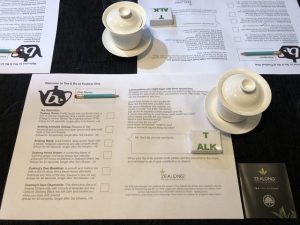
I spent the weekend in San Francisco with a church that is studying my book The Gift of Wonder. Yesterday I spent much of my day mulling over the questions they asked and the purpose of their study. I have never been involved with a church that is more interested in learning to enjoy the wonder and mystery of who God is and who God wants us to be.
How do we learn to enjoy God and appreciate the wonder of who God is, was the gist of many of the questions I was asked. It’s hard for us to view life and God “with the wide-eyed wonder of a child”, “Play, have fun, read children’s books, jump in puddles, share freely with your neighbours” were some of the things I suggested, most of which I talked about in yesterday’s Meditation Monday – Revisiting The Gift of Wonder. Unfortunately, most of us are too embarrassed to enter into childlike behavior. Instead of seeking to enjoy God and relish the wonder of a God whose very essence is love, with our hearts, we have tried to understand God with our minds. But this is not the mysterious, unknowable God of wonder whose very essence is love. Instead I think we have belittled our Creator with rules and regulations that define how we think God wants us to behave, and there is often very little love or wonder expressed in those rules.
“I am increasingly convinced that rediscovering child-like wonder and the joy of play is essential for our spiritual health. Awe and wonder, imagination and curiosity connect us to the God who is present in every moment and every thing in a way that nothing else can. These qualities do bring healing to body, soul and spirit, moving us from isolation to community and help us find safety in the presence of both God and of others.” I said in yesterday’s Meditation Monday.
In his recent book Passions of the Soul, former Archbishop of Canterbury Rowan Williams comments “We are made for seeing and sharing glory.” A similar sentiment is expressed in the Westminster Shorter Catechism which states that the chief purpose of humanity is “to glorify God and enjoy him forever.” How much joy do you get from your relationship with God? How much time do you spend relishing the wonder of who God is? These are some of the questions I ask in The Gift of Wonder that I plan to continue revisiting over the next few weeks as I reread the book. Maybe you would like to revisit The Gift of Wonder and some of its suggestions too. This week in the aftermath of the incredible solar eclipse on Monday is a great time to do that.
Another question that kept surfacing over the weekend is “How do we live in wonder when there is so much injustice, trauma and environmental devastation in our world?” That is a harder one to answer. A couple of pointers to begin with though. Don’t ask “Why does God allow this to happen? But rather Where is God in the midst of it?” Secondly look for the joy-spots. What are the glimpses of love, compassion and peace that you see lived out in the midst of the horrors of war, violence and destruction. Living in wonder is about changing our view of the world and the way we act in it. Then by drawing on the resilience, inner strength and compassion that awe and wonder instill in us we are able to act more effectively as agents of God’s change towards wholeness and flourishing that we should be.
This is part of what my upcoming webinar the Spirituality of Gardening on May 11th is all about. This virtual retreat will help reconnect us to the wonder of a God who is all around us in the natural world. We will discuss not only how the life, death and resurrection is lived out in the garden, but also how to enter into the wonder of God through creative practices like contemplative nature walks, Lectio Tierra, creating a leaf rubbing, walking barefoot, and others. This will be a fun, instructive and interactive session. I hope you will join us.
This week on Godspace, was another inspiring week. On Saturday James Amadon presented us with Seven Shifts We Need To Make, a very thought provoking article that is the first of several published on the Circlewood blog The Ecological Disciple. I agree wholeheartedly: the majority of Christian denominations, churches, and individual disciples need major reform, and that ecological disciples can help lead the way. This will entail significant shifts within every aspect of faith, including theology.” A very thought provoking read. Make sure you read the whole series. https://www.ecodisciple.com/
In her Freerange Friday: The Easter Cup of What’s Next, Lilly Lewin continued to inspire us with her “cups” TAKE YOUR CUP and Consider what’s next… what a wonderful invitation to make us pause and reflect on what Jesus means to us at this season.
On Thursday, in her post Five Myths About Empathy, Lynne Baab shared another of her husband’s awe inspiring paintings. She also discussed “myths about empathy with the goal of lightening pressure to empathize perfectly. Understanding these myths can help us develop do-able listening skills so we can enter into the lives of people we love. You may want to think about how these myths relate to compassion as well.” It is a must read post.
On Wednesday West Australian Rodney Marsh shared another in his series of “Garden Friends” introducing us to the New Holland Honey Eaters, and the lessons he learned from listening to them and watching them.
Tomorrow we will publish our next episode of The Liturgical Rebels. I am very excited about this one. It is with Mark Pierson a Baptist pastor in Auckland New Zealand. He is one of my mentors, the man who gave me permission to become a liturgical rebel. Joining us in the conversation will be my co-host Lilly Lewin, who has also been inspired by Mark and his amazing creativity. The following episode will be an interview with Lilly Lewin herself. Make sure you are up to date with your listening before this episode goes live. I am working to line up some more exciting episodes in the next few months including interviews with Shane Claiborne, Tony Jones and Brian McLaren. And in case you are concerned that most of the episodes until now have been with men, don’t worry I am working on a slew of possible interviews with some of my favorite female liturgical rebels – Kathy Escobar, Christine Valters Paintner, and Naomi Lawrence. Tom and I will be travelling to the UK for 2 weeks in June and I hope to line up another few interviews while I am over there. I am thoroughly enjoying the new aspects of life that this podcast is opening for me. I hope you are enjoying it too.
Thank you for the continuing encouragement for my move to Substack which I decided to rename “Walking in Wonder With Christine Sine. I am discovering that this too is opening up new vistas for me. New ways to hold conversations and to interact with more of you. I might even start recording some of my posts – a different kind of podcast.
Today I thought I would end with this image that my friend Forrest Inslee sent me.
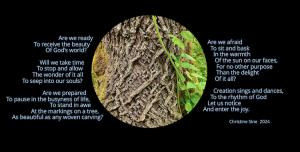
Many blessings on you all.
To Garden With God + Gift of Wonder Prayer Cards Bundle
This unique bundle includes our best selling book, To Garden with God, and 1 set of Gift of Wonder prayer cards (12 cards).
“No matter how many challenges there are, nothing can take away from the deep satisfaction of getting one’s hands into the earth, digging, planting and harvesting the bounty of God’s good creation. Nor can they detract from the joy that engulfs as as we experience the awe inspiring generosity of a God who wants to provide abundantly for all of humankind. The garden is a place of healing, of wholeness and of deeply spiritual encounters where God restores our bodies and our spirits in a way that is truly miraculous.” (from To Garden with God)
by Christine Sine
Yesterday I spoke at Grace Fellowship Community Church in San Francisco. They are doing a book study on my book The Gift of Wonder and I had the privilege of launching their study, so I thought I would take this opportunity to share with you some of what I spoke about.
Wonder is a beautiful gift from God. It changes our approach to life. Even fleeting experiences of awe focus us away from self-interest to concern for others and orient our actions towards the needs of those around us – so important in today’s world. Tomorrow we will experience an eclipse of the sun. One of my friends is travelling to Texas to enjoy the full experience. I may not see this eclipse but I do remember the last one. People in Seattle gathered in parks, laughed, cried and sang together with strangers. It was an exhilarating experience of awe and wonder.
Maybe that is part of what our scripture reading this morning is all about; Unless you dramatically change your way of thinking and become teachable, and learn about heaven’s kingdom realm with the wide-eyed wonder of a child, you will never be able to enter in. These words riveted my attention when I was preparing to write The Gift of Wonder.
When I asked my Facebook friends What childlike characteristics they thought make us fit for the kingdom an amazing list emerged: playfulness, awe and wonder, imagination, curiosity, love of nature, gratitude and many more. It was this list that formed the basis for my book.
According to Stuart Brown head of the Institute for Play, nothing lights up the brain like play. He believes it is as important as oxygen for our survival, God’s greatest gift to humankind. Adults need to play as much as kids do. And by play he means unstructured activity without a set purpose in mind. It bonds us together, heals and de-stresses us and tells people we are safe to be around.
Awe and wonder is possibly even more important. A daily dose of awe changes our attitude to the world. It moves us from individualism and materialism to community and the needs of others. It makes us more caring and compassionate people. It also brings healing to those who are traumatized and suffering from PTSD.
Yet we live in a world of play deprivation, awe and wonder depletion, and nature deficit disorder. I wonder if we suffer from God depletion too as a result.
Our world shimmers with the glory of God, but we have lost our ability to appreciate that wonder and therefore to discover the healing power it holds. Day Schildkret – Native American artist who gathers natural objects and crafts them into exotic mandalas which are illustrated in his beautiful book Morning Altars says There is a wealth of beauty and wonder littered all around us, right outside our own front door. We have just forgotten how to see it….
Robert McFarlane in another fascinating book, Landmarks suggests we have not only lost our ability to appreciate wonder but we have also lost the language to express it. In the recent update to the Children’s Oxford Dictionary, some words were taken out and others added. All those removed had to do with nature and all those added had to do with technology. We have stunned the world out of wonder he says. Even the word awesome has lost its meaning. It has become more an expression of appreciation than a gasp of awe that something is breathtakingly incredible.
McFarlane calls for the re-wonderment of the world and as we move forward in our post pandemic reality, facing the injustice of systemic racism and of war and violence this is very much what we need. We don’t just need re-wonderment of the world but re-wonderment of our view of God and a re-wonderment of our impressions of the people we share the planet with too. All of us are made in the image of God and every creature has a spark of divine life within it – now that really is awe inspiring.
Embracing re-wonderment, particularly while writing The Gift of Wonder changed me in ways I never anticipated, filling me with joy and a delight in life I never expected, especially in the midst of the world we live in which seems full of chaos, injustice and trauma.
I am increasingly convinced that rediscovering child-like wonder and the joy of play is essential for our spiritual health. Awe and wonder, imagination and curiosity connect us to the God who is present in every moment and every thing in a way that nothing else can. These qualities do bring healing to body, soul and spirit, moving us from isolation to community and help us find safety in the presence of both God and of others.
Children experience awe a hundred times a day, adults rarely do.
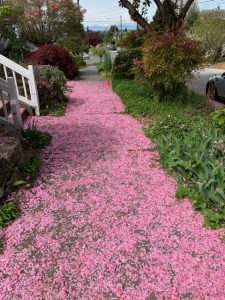
Pathway covered with cherry blossoms (c) Christine Sine
As a result of my research I added a “daily dose of awe” to my spiritual disciplines. During the pandemic, I developed what I call my awe and wonder walks, reconnecting to the wonderment of God to help me focus more deliberately on our truly awe inspiring Creator. These have become an extension of my contemplative time and the mainstay of my spiritual life. They give me peace in the midst of chaos, and strength when I feel overwhelmed. As I walk I very deliberately focus on the awe and wonder of what I see. I need to be very intentional about this. I usually like to focus on one particular aspect of my walk – the freshly emerging spring flowers, the pattern of the sky, the people and dogs I pass and greet on my way. I name the things that fill me with awe, and make joy bubble up within me. At the moment its the daffodils, tulips and myriad of flowering trees. I savour these sights and my response to them and the revelation of God in the midst of these. Then I come home and read scripture focusing on that same response of noticing and naming.
Yesterday it was my plane trip from Seattle that provided my daily dose of awe. I was the one with my window shutter up when everyone was trying to see their screens. I was inspired by the majestic mountains and the meandering rivers. which made me feel “That’s God doodling down there. .
This doesn’t mean I naively see only good things around me, Greg Boyle who works with the homeless in L.A. suggests that we can embrace the marginalized with a sense of awe too. – I am awed by their resilience, perseverance and sense of community. Greg Boyle says “Awe softens us for the thunder glance of God then enables us to glance at others in just the same way. (This is truly what I experience on my morning walks.
As I walk, I am not only caught up in the wonder of God’s beauty but also by the wonder of the depths of God’s pain and of the fact that God is willing to share our pain. This is a God who is not distant and unconcerned. Sometimes I sit in the midst of my pain. I ache and I grieve and wonder at the fact that God grieves with me. I think of those who are trying to bring aid to the people of Gaza, of those fighting in Ukraine and other wars around the globe, of those responding to the earthquake in Taiwan. In these people I feel I see God reaching out and I am awed by the evidence of God’s love in our midst.
Awe begets awe. As we take notice of the awe inspiring aspects of our world, we start to notice awe and wonder wherever we go.
I think that Jesus always maintained his childlike awe and wonder. We see it in his zest for life, enjoyment of meals, embrace of kids – all of which made him despised by the religious leaders.
I suspect he was often surrounded by kids – a little like the parade of young people that always followed me when I wandered through an African village. In my mind, when that little boy came to offer his fish and loaves to Jesus, He didn’t come alone. I imagine him surrounded by a crowd of giggling dancing kids who pushed their friend forward because they all believed Jesus could perform a miracle. And in the background are Jesus disciples worrying about how they could pay for food for this huge crowd or where on earth they could send them to buy their own food. I think that only the kids had the wide-eyed wonder it took to believe that the miracle Jesus could perform would give the whole crowd a glimpse of heaven’s abundance..
That’s why Jesus encouraged his disciples to become like children.
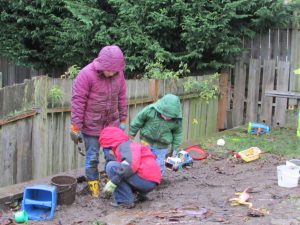
When was the last time you sat in awe of God’s greatness or jumped in excitement and shouted your praises to God believing that God still performs miracles of provision and healing?
So I would encourage you today to look back over the last week or month with the wide-eyed wonder of a child. What, has inspired and awed you – about God, about the world in which we live, about the people you have met and worked with, about the cultures you have interacted with? There is no limit to the aspects of this world that can help us experience awe and wonder and provide us with the tools we need to better engage in the pain and suffering of those around us. We do live in a wonderful world, with a wonderful God. All we need to do is to open our eyes and take notice.
We need a daily dose of awe – and it isn’t just nature that gives us a sense of awe. Here are a few steps you might like to try now, to embrace the gift of wonder:
- Read some children’s books – When I asked a good friend who is an expressive arts therapist how to open myself to awe and wonder she said – read some children’s books and she has been giving new books to me ever since. This also gave me an excuse to revisit my childhood favorites – books that most of you have never heard of “The Magic Pudding; The Adventures of Cuddlepot and Snugglepie and The Bunyip of Berkeley’s Creek. Or ask your kids, grandkids or friends’ kids which ones they enjoy most. Read them together. ‘It is always fun to hear the enthusiastic responses of children to creative words and images. At a recent baby shower I attended the only gifts that were asked for were books from our childhood. It was an absolute delight to hear people share the books that still impact their lives and provide a special glow of memory and to their lives.
- Spend time with kids – we all need kids in our lives. Not only do they help us have fun but they ask difficult questions that encourage us to let go of our pretentious and often unrealistic expectations of ourselves and others. Sometimes their questions lead us to some deep soul searching of our own. One of my friends goes on regular play dates with her nieces and nephews with the determination to do everything they do. As a result she has jumped in puddles, ran through leaves, swung on swings and made angels in the snow. She has rediscovered the joy of play and finds her life more joy filled as a result.
- Reconnect to your senses – kids view the world through all their senses, but we adults often limit ourselves to sight and sound. Even these senses have very confining borders. Go on a nature walk. Rediscover the joy of smells, the wonder of textures, the delight of sunlight through trees. Using our senses opens us to a God of delight and rejoicing who invites us to relax, to sit in contentment and wonder, or allow ourselves to be distracted by the beauty of a butterfly.
What could you do to open yourself to childlike wonder? Would you like to plan a play date, go for an awe and wonder walk or just sit and enjoy the beauty and wonder of God.
by James Amadon
previously published in The Ecological Disciple
I am convinced, more than ever, that the majority of Christian denominations, churches, and individual disciples need major reform, and that ecological disciples can help lead the way. This will entail significant shifts within every aspect of faith, including theology.
We Are All Theologians
The work of theology does not always interest people, even people of faith. Many assume that theology is reserved for those with formal training, like pastors and seminary professors. Theology can also seem a little daunting. It asks and articulates answers to big questions: Who is God? Who are we? How should we live? What is the purpose of life?
But in its most basic form, theology is simply the practice of reflecting on how God and life intersect. Most people do this at least some of the time, and every person of faith does it on a regular basis; when we pray, worship, study, or simply attend to daily life with God in mind, we practice theology. Therefore, we are all theologians! And the practice of theology is inherently practical. Since God intersects with every aspect of life (a theological belief of mine), there is no part of life that theology does not touch.
QUESTION: When and/or where do you reflect most easily or regularly on the intersection of God and life?
Theology is Always Re-forming
Good theology holds in tension what we can know and what we cannot. It is, after all, an attempt to describe the indescribable, to contain the uncontainable, to wrap our minds and hearts around the Great Mystery. It requires a mixture of boldness and humility, a willingness to declare what we believe about God while acknowledging that those beliefs may change. This work is not meant to be done as individuals; theology is a communal endeavor. Our churches, denominations, and broader traditions have ways of understanding the intersection of God and life that have been shaped, debated, passed down, and practiced over time. These beliefs have shaped the lives of countless believers in their individual faith practices, work life, home environment, community engagement, church formation, political outlook, and so on. They have most certainly shaped you.
But our theological traditions are not static; theology is always in flux, because we are reflective creatures who are able to change how we think and live based on new understanding or new situations. There is a Latin phrase that is often used to capture this – Ecclesia semper reformanda: “The Church is always reforming.” Some reforms are good; I consider the shift in most Protestant churches to recognize and welcome women’s gifts for all areas of ministry a positive (and overdue) change. Some reforms are not so good; I consider the Doctrine of Discovery, which gave theological justification for European colonial expansion and exploitation of “new lands,” a profoundly destructive innovation (and am pleased that my particular church family has formally repudiated it).
If you have been a follower of Jesus for a while, chances are your understanding of the intersection of God and life – your theology – has shifted. This is normal and natural – as the Apostle Paul wrote in 1 Corinthians 13,
“When I was a child, I talked like a child, I thought like a child, I reasoned like a child. When I grew up, I put the ways of childhood behind me.”
In other words, his faith matured. What is interesting is that Paul did not equate maturity with theological certainty. The very next verse says,
“For now we see only a reflection as in a mirror; then we shall see face to face. Now I know in part; then I shall know fully, even as I am fully known.”
QUESTION: How has your theology changed over the years? What has helped you develop a more ecologically conscious faith?
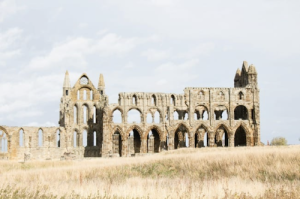
Shattering the Intolerable Carapace
While most reforms are limited to particular times, people, and places, every now and then a moment arrives which calls for widespread, radical reform. These are times when the forces of history and the breath of the Spirit brings us to a moment when we recognize that an entire belief system has gone off the rails, and that we need to completely reimagine our core theology, identity, ethics, and mission. The late religious scholar and writer Phyllis Tickle identified these moments as more or less occurring every five centuries.
“[A]bout every five hundred years the empowered structures of institutionalized Christianity, whatever they may be at the time, become an intolerable carapace that must be shattered in order that renewal and new growth may occur.”
Tickle believed that we are in one of these moments right now, and I agree. As I have written elsewhere, the Western theological tradition, along with the cultures it has helped shape, has played a key role in leading us to our current moment of ecological and cultural crisis. Two significant theological pillars bear much of the responsibility for this:
- The tendency to overemphasize God’s transcendence and separateness from creation.
- The placement of humanity in a position of dominance and self-serving rule over the earth and other creatures.
The destructive implications of these theological pillars are becoming clearer by the day – here are two big ones:
- The reduction of religion and spirituality to non-physical, “heavenly” ideas. This keeps God “up there” and relegates the created world to temporary background scenery while we pursue “higher” spiritual reality. We are taught that God cannot truly be found in the created world, despite most people’s experience and the irrevocable marriage of Spirit and matter in Jesus! And so we pursue God apart from the world that God creates, redeems, and inhabits.
- The license to exploit and abuse land, water, air, plants, animals, and our fellow human beings. This is a reversal of our God-given vocation of earthkeeping and has become exponentially more damaging through modern scientific and technological power. Instead of helping God creatively weave the world into ever more flourishing webs of life, we are pulling everything apart.
Confronting, critiquing, and reversing the damage that the Western Christian tradition has wrought requires more than just tweaking our beliefs and practices – the very foundations of faith need to be “shattered in order that renewal and new growth may occur.” But we must also pick up the shattered pieces and begin forming a new faith that can cultivate the renewal and new growth that we need. All this requires massive shifts in what we believe and how we live out those beliefs. This is my attempt to articulate these shifts and invite you to help build the foundation on which a renewed faith will arise.
The Seven Shifts
Here are brief descriptions of the seven shifts we must make:
- A New Cosmology – We need to shift the way we perceive creation from static backdrop in the human drama to dynamic creation in which we play one of many roles.
- A Bigger Story – We need to shift our understanding of the gospel from human-focused salvation to the renewal of creation.
- A Servant Humanity – We need to shift our role on the earth from independent masters to interdependent servants.
- A Place-Based Discipleship – We need to shift how we follow Jesus from generic placelessness to bioregional particularity.
- A Creational Mission – We need to shift our common calling from saving souls/society to cultivating life in the new creation.
- An Interconnected Church – We need to shift our families of faith from splintered sects to creative collaborators.
- A Different Destination – We need to shift our future hope from an earthless heaven to a heavenly earth.
QUESTION: Which shift interests you the most? Why?
These shifts have already started to happen in individuals, communities, and places all around the globe, but we need more followers of Jesus to explore, embrace and share them. That is why I am writing about each one in The Ecological Disciple. Your questions, ideas, and feedback are welcome. Let me know what resonates, and what I may be missing. Let’s learn together.
With you on the Way,
James
I can be reached at james.amadon@circlewood.online.
photo by June Friesen
Spirituality of Gardening – A virtual retreat with Christine Sine
We who follow Jesus know in our hearts that we are Easter People, people of the resurrection, people who are called to live out a new way of love and justice in our neighborhoods and in the world. We know these things in our hearts, but the stuff of life too often gets in the way of actually living it out.
How have we forgotten that it’s still Easter? This week after the Resurrection have we lost sight of the power of Holy Week? Have we already moved on to the next thing and lost sight of the celebration? Are we still in the Upper Room waiting for what’s next? Or are we more like Thomas, out and about doing the next things and needing more proof?
Too often we forget that Easter is a season of the church year, not just one day! It’s Eastertide!
Eastertide “Traditionally lasting 40 days to commemorate the time the resurrected Jesus remained on earth before his Ascension, in some western churches Eastertide lasts 50 days to conclude on the day of Pentecost or Whitsunday.” Wikipedia
JOHN 20: 19-31 NIV
On the evening of that first day of the week, when the disciples were together, with the doors locked for fear of the Jewish leaders, Jesus came and stood among them and said, “Peace be with you!” After he said this, he showed them his hands and side. The disciples were overjoyed when they saw the Lord.
Again Jesus said, “Peace be with you! As the Father has sent me, I am sending you.” And with that he breathed on them and said, “Receive the Holy Spirit. If you forgive anyone’s sins, their sins are forgiven; if you do not forgive them, they are not forgiven.” Now Thomas (also known as Didymus), one of the Twelve, was not with the disciples when Jesus came. So the other disciples told him, “We have seen the Lord!”
But he said to them, “Unless I see the nail marks in his hands and put my finger where the nails were, and put my hand into his side, I will not believe.”
A week later his disciples were in the house again, and Thomas was with them. Though the doors were locked, Jesus came and stood among them and said, “Peace be with you!” Then he said to Thomas, “Put your finger here; see my hands. Reach out your hand and put it into my side. Stop doubting and believe.” Thomas said to him, “My Lord and my God!”
Then Jesus told him, “Because you have seen me, you have believed; blessed are those who have not seen and yet have believed.” Jesus performed many other signs in the presence of his disciples, which are not recorded in this book. But these are written that you may believe that Jesus is the Messiah, the Son of God, and that by believing you may have life in his name.
Are you having an easy time of believing right now or do you need Jesus to prove himself…to prove he’s real? TALK to God about this..
It’s totally OK with God if you have doubts…God’s not afraid of your doubts or your questions …
What would it take for you to believe right now?
What things help you see, touch, feel and experience Jesus?
The Resurrected Jesus has a new body, a new form that can walk through walls and disappear but He still has his wounds. What does this say about our own woundedness and brokenness?
Jesus breathes on them and fills them with the Holy Spirit. What do you need Jesus to breathe into you this Eastertide?
Are you needing more of the Spirit? Or perhaps something else…like presence, new vision, peace, joy, hope, rest, trust, love, forgiveness, or freedom….Sit still with Jesus and breathe. Imagine him with you breathing in and out with you. Talk to Jesus and tell him how you are feeling this week after Easter. Take a deep breath.. Breathe in that peace. Ask Jesus to breathe into you what you need this season. He might reveal to you something you didn’t even know you needed. BREATHE IN God’s Peace, BREATHE out your fear. BREATHE in God’s peace, BREATHE in the never ending love of Jesus, BREATHE out all self doubt and hate, BREATHE IN the LOVE of Jesus, BREATHE!
TAKE YOUR CUP and Consider what’s next…
The Cup of What is Next?
The disciples now had a new reality, Jesus was no longer dead! For some this was exciting, for others like Thomas they needed proof, or like Peter, this new world made life uncertain. So he goes back to what he did before, fishing! They all wondered what they were they supposed to do now? How do they live? They were being invited into a new life of resurrection, a new life of living out the ways of Jesus. As you drink from your cup today,and in the days ahead, talk to Jesus about any doubts, fears or uncertainties you have about what is next in your life. Ask Jesus to show you his great love in the middle of the questions and the waiting on what is next. Remember that like Peter, Jesus has a call and plan for you and loves you more than you can even imagine! READ John 21: 15-25
How do you want to live out EASTER this year? How do you want to live into resurrection and new life? How can you choose to receive the resurrection in your own life and walk in freedom?
HOW CAN YOU LIVE OUT RESURRECTION THIS WEEK? How do you need to experience more of the Shalom of Jesus? That peace that surpasses understanding and truly fills you with healing and wholeness. BREATHE IN THAT PEACE. BREATHE IN SHALOM. BREATHE with Jesus the Resurrected one! and let Jesus surprise you with his presence and love this week! IT”S STILL EASTER and Jesus knows what is next!
As an Amazon Associate, I receive a small amount for purchases made through appropriate links.
Thank you for supporting Godspace in this way.
When referencing or quoting Godspace Light, please be sure to include the Author (Christine Sine unless otherwise noted), the Title of the article or resource, the Source link where appropriate, and ©Godspacelight.com. Thank you!

